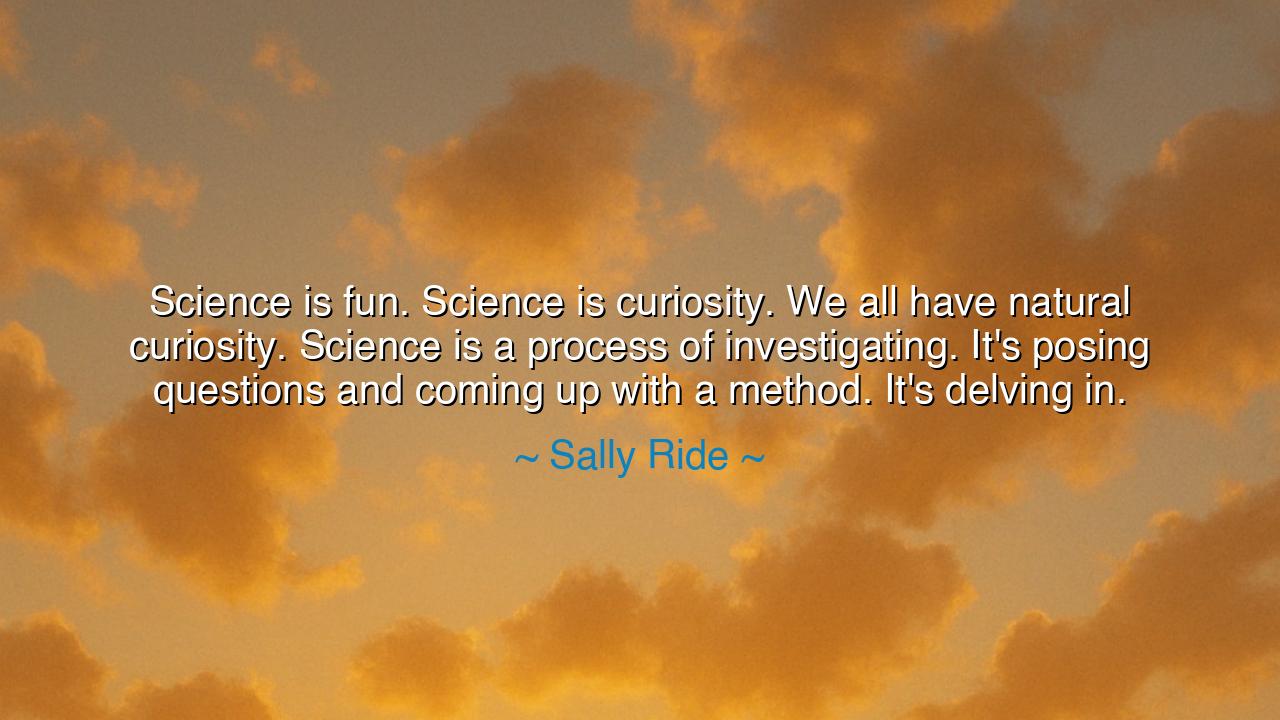
Science is fun. Science is curiosity. We all have natural
Science is fun. Science is curiosity. We all have natural curiosity. Science is a process of investigating. It's posing questions and coming up with a method. It's delving in.






"Science is fun. Science is curiosity. We all have natural curiosity. Science is a process of investigating. It's posing questions and coming up with a method. It's delving in." These words, spoken by the legendary Sally Ride, carry within them a truth that transcends the rigid halls of laboratories and academic institutions. Science is not merely an intellectual pursuit or a series of cold experiments; it is, at its core, an adventure, a deep and passionate exploration of the world around us. It is the act of investigating, of diving into the unknown with a heart full of wonder, and the mind prepared to seek, question, and discover.
From the dawn of humanity, we have been driven by an inherent curiosity, a desire to understand the world, to see beyond what is visible, and to uncover the mysteries that lie hidden. This innate hunger for knowledge is not a modern invention—it is as ancient as the first time we looked up at the stars and wondered, “What lies beyond?” Just as the ancient philosophers such as Socrates and Aristotle marveled at the workings of the universe, so too do we continue to be driven by the same questions. The early philosophers, guided by their curiosity, sought to understand the nature of existence, to ask questions about the world that were once unthinkable. Sally Ride reminds us that this same curiosity lies within each of us, waiting to be nurtured and explored.
Consider the journey of Galileo Galilei, who, equipped with his primitive telescope, looked into the heavens and dared to question the established understanding of the cosmos. In his time, to say that the Earth was not the center of the universe was to challenge the very foundations of belief and authority. Yet, driven by a curiosity that could not be contained, Galileo delved deep into the study of the heavens, asking questions no one had dared to ask before. His investigation led him to profound discoveries, from the moons of Jupiter to the phases of Venus, forever altering our view of the universe. His story is a testament to the power of curiosity and the importance of asking questions—no matter how daunting they may seem.
And let us not forget the journey of Sally Ride herself, who, as the first American woman in space, took that very curiosity into the vast unknown of space. Ride’s quest for knowledge, her dedication to investigation, and her willingness to pose questions about the universe led her to the stars. In her mission, she not only embraced the scientific method, but she embodied the spirit of discovery that drives all great scientific progress. Ride’s achievement serves as a powerful reminder that science is not merely about the accumulation of knowledge—it is about the joy of exploration, the excitement of new questions, and the constant push to uncover more.
Science, as Sally Ride teaches us, is not just a profession; it is a way of being. It is the constant search for answers to the questions that arise from our natural curiosity. It is about posing questions, devising methods, and diving deep into the unknown. It is a process, one that demands patience, persistence, and a willingness to accept that not all answers come immediately. Like the slow and steady flow of a river, science carves its path through the landscape of mystery, and in that journey, it brings us closer to the heart of understanding. But the true beauty of science lies in the fact that, as we uncover one answer, we are left with even more questions—an endless cycle of inquiry that propels us forward.
In our own lives, we must embrace this spirit of curiosity that Sally Ride so passionately speaks of. Let us not view science as a distant, inaccessible field, but as a practice that is alive within each of us, as natural as the curiosity we felt as children. Whether in our careers, our relationships, or our understanding of the world, we can all adopt the scientific process of questioning, investigating, and delving into the mysteries around us. Ask questions—don’t settle for the easy answers, but challenge the assumptions that others may hold. Use the method of inquiry in every aspect of your life, and do not be afraid to explore uncharted territory, for it is through exploration that we grow, learn, and evolve.
The lesson here is simple but profound: science is not a distant, dry discipline, but a living, breathing pursuit that flows through all of us. Embrace your curiosity. Ask questions. Seek answers. Use the process of investigation in all that you do. Just as the greatest minds of history have ventured forth into the unknown, so too must you embark on your own personal journey of discovery. And in that journey, you will find not just knowledge, but a deeper connection to the world and to the very essence of human adventure. Let your passion for discovery guide you, and may your life become an ongoing testament to the joy of scientific exploration.






AAdministratorAdministrator
Welcome, honored guests. Please leave a comment, we will respond soon